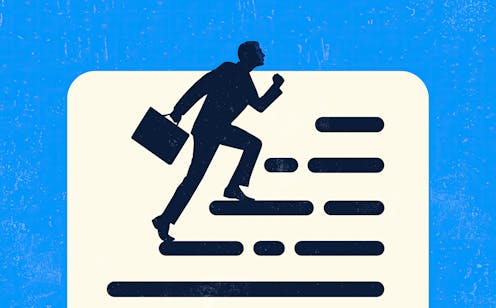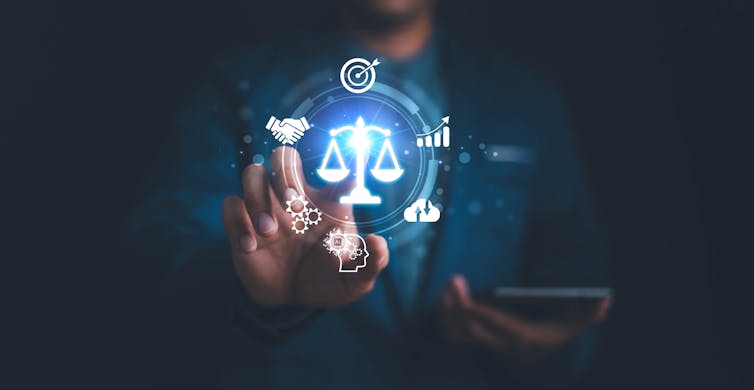Legal complications await if OpenAI tries to shake off control by the nonprofit that owns the rapidly growing tech company
- Written by Jill Horwitz, Professor of Law and Medicine, University of California, Los Angeles
 Severing ties to its nonprofit owner would be far more easily said than done.rob dobi/Moment via Getty Images
Severing ties to its nonprofit owner would be far more easily said than done.rob dobi/Moment via Getty ImagesOpenAI, the tech company that created the popular ChatGPT chatbot, is at a crossroads.
It began as a nonprofit dedicated to developing artificial intelligence systems smarter than humans. Since its founding, OpenAI has boasted that it was upholding its nonprofit goal – “to build artificial general intelligence (AGI) that is safe and benefits all of humanity.”
Now, its tune has changed. OpenAI’s leadership is reportedly taking steps to transform it into a for-profit company. If that happens, the nonprofit would lose control.
We are law professors who specialize in nonprofits. As we explained in an earlier article, all charities must devote their assets to their legal purposes. If OpenAI hoped to have a quickie divorce from its charitable obligations, it is now learning how costly that could be.
Proposing divorce from charitable vows
OpenAI began in 2015 as a scientific research nonprofit. Four years later, its board decided that achieving its lofty goals required more than gifts and grants.
It reorganized to accommodate and attract private investment. As a result, the company known as OpenAI is neither a single nonprofit nor for-profit company; it is a set of interlocking entities, including the for-profit subsidiary that conducts its operations.
As a whole, OpenAI is ultimately required to advance the nonprofit’s purposes. These purposes represent the promises OpenAI made to the public when it was founded.
OpenAI’s nonprofit certificate of incorporation states the purposes: “to provide funding for research, development and distribution of technology related to artificial intelligence,” thus producing technology that “will benefit the public.”
For almost a decade, OpenAI proclaimed its commitment to safe scientific development, making it a higher priority than earning profits. For example, OpenAI warned investors that “the Company may never make a profit,” and that “it would be wise to view an investment … in the spirit of a donation.”
Nevertheless, if profits were made, investors like Microsoft were entitled to receive them – collecting up to 100 times their investment, before the nonprofit parent could take any share of those gains.
Having second thoughts
CEO Sam Altman and his colleagues have apparently had second thoughts about their vows.
According to widespread media reports citing unnamed sources, they want to restructure and remove the nonprofit parent from its controlling perch, turning the rest of the company into a benefit company – a type of for-profit enterprise with some public-interest goals.
Those media reports relay that the US$6.6 billion in recent investments in OpenAI is conditioned on OpenAI converting to a for-profit company within two years.
If this conversion fails, OpenAI must return that money. Investors also want to remove any caps on their investment returns. Altman himself now reportedly wants to own a piece of the company.
Not moving so fast
Changing a nonprofit to a for-profit company, known as a “conversion,” often requires only a board vote and filing forms with state regulators.
Delaware, where OpenAI was established, would regulate at least this filing process. When a nonprofit has significant operations in another state, then that state also has authority to regulate the conversion. In this case, that would be California, where OpenAI is headquartered and holds most of its assets.
The state attorneys general for Delaware and California are reviewing the proposed restructure. Delaware Attorney General Kathy Jennings has asked for more information about how the nonprofit’s rights would be protected if OpenAI carries out its reported restructuring plans.
And California Attorney General Rob Bonta announced that his office is “committed to protecting charitable assets for their intended purpose.”
With OpenAI valued at $157 billion, the nonprofit’s fair share could make it the wealthiest foundation in the United States. The Bill and Melinda Gates Foundation, currently the largest U.S.-based foundation, holds $75.2 billion in assets. Harvard’s endowment, the largest for a U.S. university, has about $53.2 billion in its coffers.
State regulators, which supervise the transformation of nonprofits into for-profits, oversaw many conversions of health insurers and hospitals in the 1990s. For example, the California attorney general oversaw Blue Cross Blue Shield of California’s payments of $3.2 billion to establish two new health care foundations when it converted. Critics subsequently pointed out that investors in such for-profits made even greater gains a short time later.
We believe that if the nonprofit gets its fair share of OpenAI, those health care transactions would pale in comparison to the scale of an OpenAI conversion.
 There are legal ramifications if a group decides to drop its nonprofit status.Suriya Phosri/iStock via Getty Images Plus
There are legal ramifications if a group decides to drop its nonprofit status.Suriya Phosri/iStock via Getty Images PlusEstimating what’s at stake
To be sure, the nonprofit would not be entitled to receive the full $157 billion in a conversion of OpenAI. So what is the nonprofit entitled to?
First, the nonprofit parent has a right to the value of its share of ownership of the for-profit operations. That value would include the value of the properties owned by the for-profit subsidiary, such as ChatGPT.
The nonprofit should also be compensated for giving up its control over the whole OpenAI enterprise. Typically, investment bankers assess the value of control somewhere between 20% and 40% of the value of the company.
What could be the hardest part of this process would be estimating the value of the right to OpenAI’s future profits. Under the current arrangement, investors first get 100 times their investments in OpenAI before the nonprofit receives any share of the profits.
Microsoft has invested $13 billion in OpenAI so far. But let’s assume total investment of $10 billion: OpenAI would need to make $1 trillion before the nonprofit would get its piece of the pie. Since only 10 companies have made over 100 times the amount invested in them in the past decade, this is a high bar.
Protecting the nonprofit
Although state attorneys general have the leading role in protecting the nonprofit, they do not have to do this work alone.
First and foremost, the existing nonprofit’s board members are legally required to protect the nonprofit and its purposes. This puts them roughly on the same team as the state attorneys general.
The board could decide that OpenAI’s charitable purposes are best protected by spinning off the for-profit company. Even so, it must ensure that the nonprofit is adequately compensated.
Other authorities may play a role. For example, if a state attorney general can’t broker an agreement with OpenAI, they might farm out the work. Either a state attorney general or a court could authorize a third party, such as another charity, to bring a claim to protect the nonprofit assets.
In addition, the IRS could step in.
The tax collection and enforcement agency has the responsibility to ensure that assets held by a nonprofit tax-exempt organization remain within the charitable sector. In this case, that would mean ensuring that OpenAI’s nonprofit gets what it’s owed.
As an added wrinkle, billionaire entrepreneur Elon Musk has already weighed in as a former board member. He filed a lawsuit in February 2024 to protect OpenAI’s charitable commitments, withdrew it, and refiled it. Now, he has brought Microsoft into the fray, arguing that Microsoft’s partnership with OpenAI is allowing the two companies to bypass antitrust laws.
We’re certain that if OpenAI does embark on a journey to for-profit status, that road will be long and bumpy. In determining the value of OpenAI’s assets and who owns them, the state regulators and the nonprofit board are empowered to fully protect the nonprofit – not OpenAI’s CEO, its employees, the for-profit company itself, or any investor.
The authors do not work for, consult, own shares in or receive funding from any company or organization that would benefit from this article, and have disclosed no relevant affiliations beyond their academic appointment.
Authors: Jill Horwitz, Professor of Law and Medicine, University of California, Los Angeles

